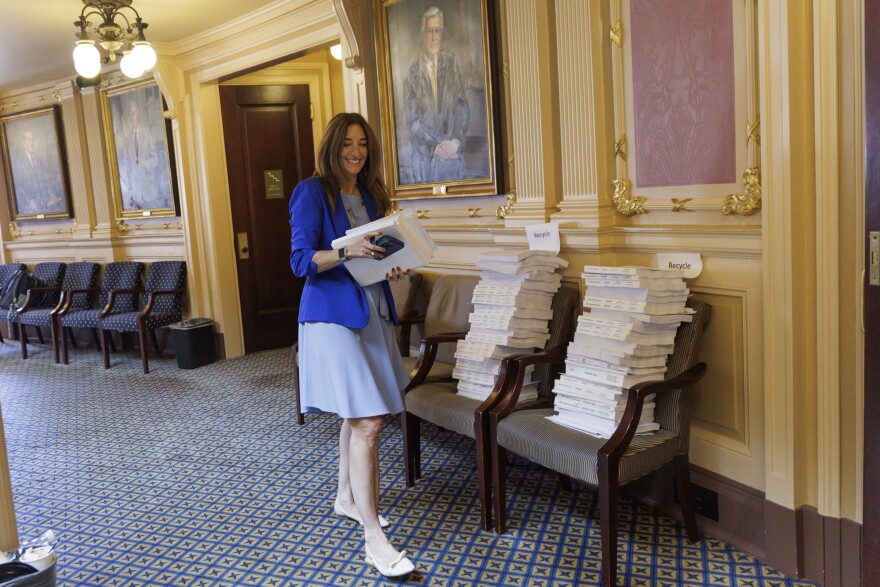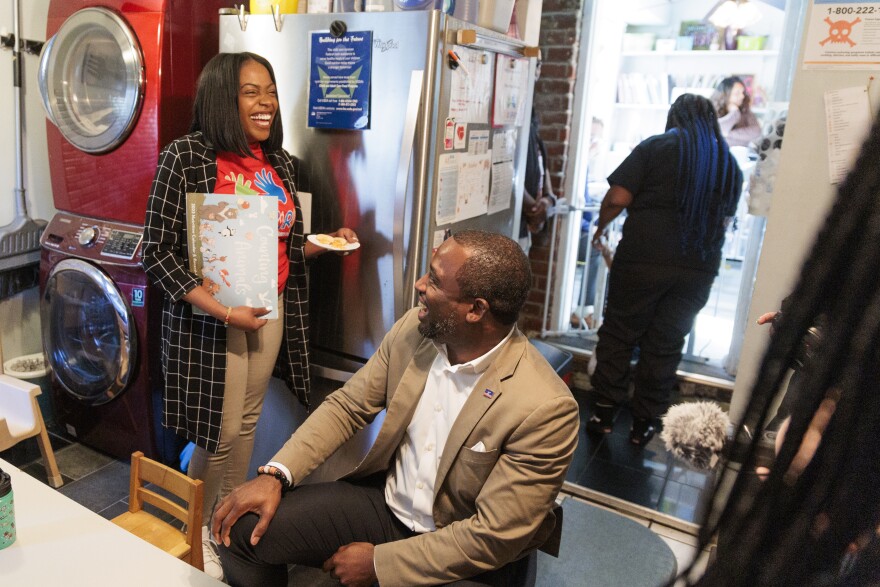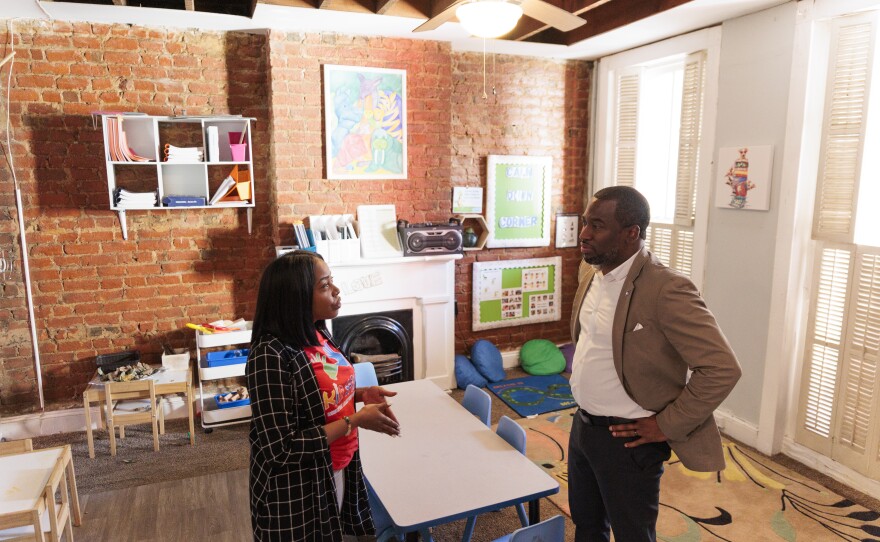When the pandemic hit, Mashaunda Collins had just moved into her current Jackson Ward home — and business location — after a stint providing child care out of her Manchester apartment.
She knew the property owner, who also owned the barber shop next door. He told her she could rent the place for $2,700 a month but would have to fix it up herself. She told VPM News she spent about $30,000 making updates.
“I put in a lot of work to get it up to code, to be able to run as a licensed facility, but it was worth it,” Collins said.
Collins decided to live in the upstairs of the row home and operate her day care center Kid Spirt LLC out of the downstairs space. She secured licensing to serve up to 12 kids across two classrooms as a family day home. But after COVID-19 began spreading, families started keeping their kids home.
“As soon as COVID hit, my enrollment went from five to zero,” Collins said. “Parents were scared to send their children to child care.”
Without federal relief dollars, Collins said her business wouldn’t have survived. An increase in subsidy payments from the state also helped her with overhead and payroll costs. Collins said the amount she received for each toddler doubled from around $30 to $60 per day — which covers the $295 of weekly tuition for most of her families.
Even then, Collins said she was — and still is — just breaking even.
“That’s the lowest I can go right now,” Collins said. “I don’t even pay myself, which is not OK.”
Future viability of Virginia child care
There is now a looming fiscal cliff on the horizon, with tens of thousands of Virginia children expected to lose care in the coming months if additional investments aren’t made to sustain pandemic-era funding levels.
Virginia child care providers received close to $500 million in stabilization grants that have already expired, with millions in other grants designed to help subsidize care for low-income families expiring next year.
Century Foundation Fellow Laura Valle-Gutierrez said most child care centers used the stabilization grants to help increase wages for providers, but day home providers who serve 12 kids or less in their own homes — like Mashaunda Collins — used the funds for rent or mortgage payments.
“We have this major work shortage,” Velle-Gutierrez said. “So, the stabilization grants were actually able to help providers stabilize and build their supply.”
The Virginia Department of Education estimated that over 35,000 children will lose care starting in July 2024. They estimated that even more working parents will experience a child care-related job disruption due to the loss of child care.
Another national report said that the loss of child care slots could be even more dramatic — with over 2,800 child care jobs lost.
“If this fiscal cliff happens like we think it’s going to, there are going to be thousands of workers who aren’t going to be able to remain employed,” said Ann Payes, chief executive officer of Thrive Birth to Five.
The bulk of children estimated to lose care in Virginia are currently enrolled in the Child Care Subsidy Program, which subsidizes the cost of care for low-income families. The number of children served in this program is expected to drop from around 44,000 children to one-fourth of that — 11,000 — next summer.
Legislation in 2021 expanded eligibility for this program, temporarily allowing families making up to 85% of the state median income — about $98,000 for a family of four — to receive subsidized child care through the CCSP program. No families had to pay anything for care until the end of September 2023, Payes told VPM News.
“It served as the largest increase in affordable child care in the commonwealth’s history,” Virginia Del. Eileen Filler-Corn, the bill’s sponsor, told VPM News.

A recent report from Vanderbilt University estimated that just one year of early child care funding in Virginia led to over 10,000 newly employed moms — and over 5,000 children under the age of 5 being lifted out of poverty.
“Maintaining recent expansions to the Child Care Subsidy Program is the state’s best opportunity to improve access for families that are most likely to not work because of child care,” stated an October JLARC report.
But funding for this expansion — made possible with over $1 billion in federal COVID-19 relief dollars in FY20 and FY21 — is also slated to expire without additional investments at the state or federal level.
Payes said child care providers are going to be forced to make it work with less funding than before the pandemic, in part because many used relief funds for additional staff investments.
“With the ARPA dollars, we have encouraged providers to increase their salaries so that they would have increased retention and recruiting, increased skills, so that staff would stay at the child care providers for longer,” Payes said.
For example, the president of a child care provider in Northern Virginia said he used COVID-19 relief funds to provide health insurance to staff — for the first time.
“Our challenge now, as we face a future without ARPA funds or other federal help, is how to maintain this important staff benefit,” said J. Glenn Hopkins, president of Hopkins House, in a September U.S. Senate Committee meeting.
According to a recent state report, child care is already unaffordable for nearly all low-income Virginia families — especially for infant and toddler care.
“I anticipate many [providers] aren't going to be able to make it work or they're going to have to charge families dramatically higher fees,” Payes said.
Payes and other experts thought there would be more state funding for child care in the budget that was approved in September. They're hoping the budget state lawmakers work on when they convene in January will include additional investments to help providers weather the impending federal fiscal cliff.
JLARC estimated it will cost at least $319 million annually on top of base-level program costs to sustain the pandemic-era expansions of the Child Care Subsidy Program. That would ensure providers like Collins keep getting a higher reimbursement rate for care and families have lower — and sometimes zero — copays, based on family income.
Collins said “it’s not even worth it” to provide care for the old reimbursement rates of around $25 per day for infants and toddlers.

“I can’t afford to have a staff member here on $25 per day, per child,” Collins said. “There’s no room for overhead, there’s no room for food, supplies. That cost model just didn’t work.”
Additionally, Collins said before copays were lowered during the pandemic, a couple of families had to pull their kids out of her program because they couldn’t afford tuition.
Filler-Corn said the governor needs to include money to maintain recent child care expansions in his next budget when it’s presented to lawmakers. She also pointed to a stalled legislative effort to legalize the sale of recreational marijuana — of which 40% of tax revenue would’ve been dedicated to pre-K programs
“That was on track to provide millions of dollars a year in tax revenue to early childhood programs,” Filler-Corn told VPM News. “So without that, that puts us even further back in. It was a significant funding stream that all of a sudden is gone. So what are we going to do about that?”



